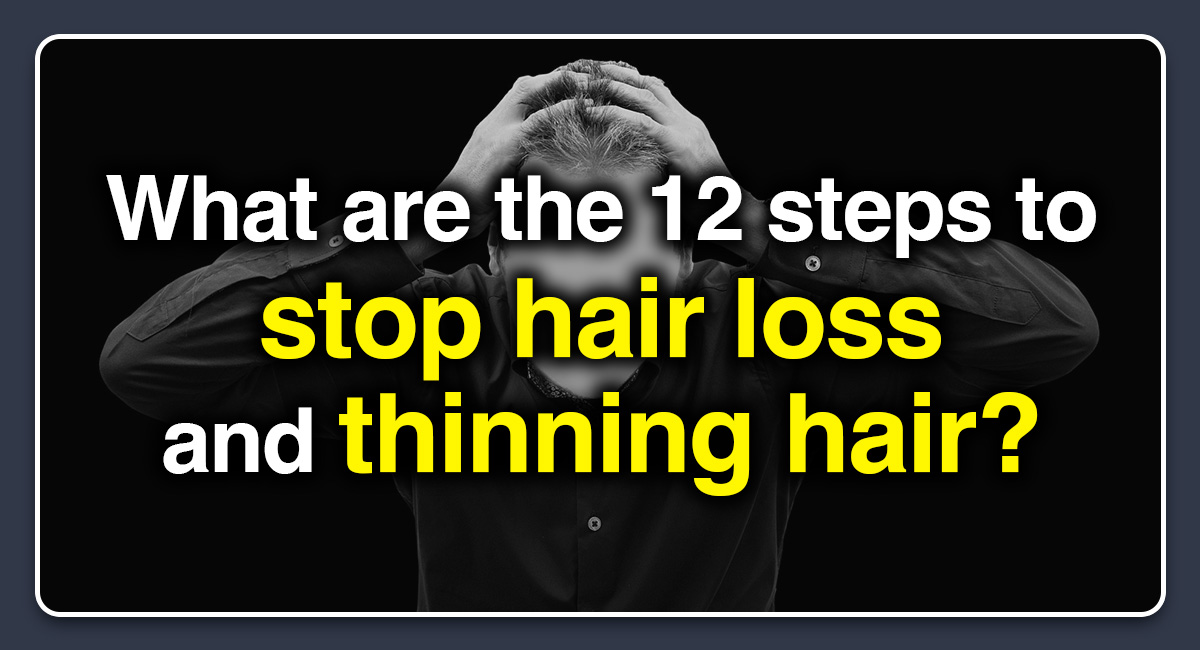According to the Academy of Dermatology, it is common to shed 50-100 hairs per day. If you lose more than this amount of hair, it can lead to excessive hair loss, which can lead to overall hair thinning.
Unlike extensive hair loss, thinning hair does not necessarily lead to baldness. However, the hair on the head may appear to be thinning.
Thinning hair progresses gradually, so there is time to identify the cause and consider the best treatment options.
The 12 steps outlined in this article may help you with hair loss and thinning hair.
PR
Contents
1 What are the causes of thinning hair?
Thinning hair can be caused by lifestyle, genetics or a combination of both. Certain diseases may also cause thinning hair.
Lifestyle habits include
Over-care of hair.
Dyeing, perming, and relaxing your hair.
Using harsh hair care products.
Using harsh products on your hair, such as hairspray and gel.
Doing tight hairstyles.
Coiling your hair or putting it in a ponytail pulls your hair and breaks the roots, which can cause thinning over time.
Not getting enough of certain nutrients in your diet.
Iron, folic acid and other minerals help hair follicles grow hair naturally.
Chronic stress.
Stress is associated with elevated levels of hormones such as cortisol. Excessive stress hormones can lead to conditions such as capillary dystrophy, in which the hair falls out and the follicles go into a long "dormant" period, preventing the growth of new hair.
Thinning hair can also be the result of genetics or an underlying condition. You may be suffering from thinning hair if you have
- Recently had a baby.
- Have recently stopped taking birth control pills.
- Hormonal changes.
- You have lost a lot of weight in a short period of time.
- Being treated for an autoimmune disease.
- have an abnormal immune system
- Skin diseases or infections
- Vitamin D deficiency.
2 Treatment and home remedies

Some cases of thinning hair can be treated at home. The following 12 measures may help, but you should consult a clinic first.
1. Scalp massage
Advantages: affordable and easily accessible.
Disadvantages: Does not address thinning hair caused by an underlying condition.
Perhaps scalp massage is the cheapest way to get thicker hair. If done correctly, it causes no harm.
When washing your hair, gently press your scalp with your fingertips to stimulate blood flow. For extra results, you can also try using a handheld scalp massager to remove dead skin cells.
2. Essential oils
Pros: Animal studies have shown efficacy, and essential oils are readily available in health food stores and pharmacies.
Cons: Not enough research has been done on humans.
Essential oils are liquids extracted from certain plants and are used primarily in aromatherapy and other alternative medicine.
Lavender essential oil has been used successfully on patients with patchy baldness. Animal studies have also confirmed the effectiveness of lavender essential oil, although human trials are needed to confirm its effectiveness. Lavender essential oil is often used in combination with other essential oils, such as rosemary and thyme essential oils.
However, there is not enough evidence to suggest that essential oils can treat baldness or thinning hair. It is recommended to dilute essential oils with a carrier oil.
Apply a small amount of essential oil to your arm and check for a reaction after 24 hours. If there is redness or other irritation, hives or a rash, it may indicate an allergic reaction and should not be used. 3.
3. Shampoo for thinning hair
Pros: Can be used in conjunction with a scalp massage, some products can be purchased over the counter.
Cons: Volumizing shampoos do not address hair loss alone and may require a prescription.
Hair loss shampoos work in two ways. First, these products add volume to the hair, making it appear thicker. This is useful for people with thinning hair or hair that has always been fine.
In addition, shampoos for thinning hair and hair loss contain vitamins and amino acids that promote scalp health. For best results, use these products as directed.
You can also ask your doctor for prescription strength shampoos.
4. Multivitamins
Pros: multivitamins are effective for thinning hair caused by nutritional deficiencies and are commercially available.
Cons: Excessive nutrition may be harmful.
Healthy hair depends on overall health. Malnutrition and certain eating disorders may prevent hair follicles from producing new hair. Blood tests can determine if you are malnourished.
If you are deficient in certain key nutrients, your doctor may recommend a daily multivitamin. Iron, folic acid and zinc are necessary for healthy, thick hair growth. Look for nutritional supplements for men and women that meet these requirements.
However, if you're already getting the nutrients you need, don't take additional vitamin supplements. There is no evidence that this will improve thinning hair, and taking too much of certain nutrients may be harmful.
5. Folic acid supplements
Pros: Over-the-counter supplements can treat folic acid deficiency.
Cons: Lack of evidence of efficacy.
Folic acid is a B vitamin that is important for the production of new cells. Several studies have suggested that folate deficiency may be associated with certain types of hair loss.
However, as with multivitamins, there is not enough evidence to ensure that folic acid helps thicken hair.
6. Biotin
Pros: Biotin is widely available on the market and may be able to treat biotin deficiency.
Cons: There is not enough evidence that it is effective for thinning hair.
Biotin or Vitamin B7 is a water-soluble nutrient found naturally in foods such as nuts, lentils and liver.
A balanced diet is unlikely to be deficient in biotin. However, in recent years biotin supplements have become increasingly available. This is thanks to advertising claims that biotin provides more energy and promotes hair growth.
Biotin helps to break down enzymes in the body, but there is little evidence that it helps with thinning hair.
People taking vitamin B5 supplements should not take biotin. If taken together, they may reduce each other's effectiveness.
7. Omega-3 and Omega-6 Fatty Acids
Pros: These fatty acids help fight inflammation and are available over the counter.
Cons: Further research is needed.
Omega-3 and omega-6 fatty acids are known as essential fatty acids. This is because the body cannot make them.
Omega 3 helps fight inflammation, which is the root cause of many diseases. Premature hair loss can also be linked to inflammation.
On the other hand, Omega-6 is important for overall skin health and may have an effect on the scalp.
Omega-6 fatty acids are found in vegetable oils, while omega-3 fatty acids are found in fish and some seeds. If you don't consume these foods regularly, talk to your doctor about taking supplements.
8. Minoxidil
Pros: Minoxidil is FDA-approved and commercially available.
Cons: It may irritate the scalp and must be used consistently to maintain results.
Minoxidil, known by the brand name Rogaine, is an FDA-approved over-the-counter hair loss treatment.
Minoxidil is applied directly to the scalp twice daily to gradually thicken hair in bald areas. The product is available in both liquid and foam dosage forms, depending on personal preference.
Rogaine may take up to 16 weeks to show visible results. It is important to use the product consistently or you may not see results.
Side effects may include scalp irritation and unwanted hair growth on the face and neck.
9. Spironolactone
Pros: spironolactone treats thinning hair caused by too much aldosterone hormone.
Cons: Available by prescription only and may cause side effects such as headaches and dizziness.
Spironolactone (aldactone) is used to treat thinning hair associated with excessive aldosterone production (aldosteronism). Aldactone is a diuretic or "water pill" used to treat high blood pressure and edema, but it also has anti-androgenic properties.
For women, this medication helps treat thinning hair and subsequent hair loss associated with hormonal fluctuations.
10. Finasteride
Pros: the first FDA-approved oral medication to treat male pattern baldness.
Cons: Available by prescription only and generally not considered for use in premenopausal women.
Finasteride (Bupropion) is a prescription hair loss treatment. Unlike topical treatments such as minoxidil (Minoxidil), Bupropion is a daily tablet that can be taken by men suffering from hair loss.
People of any age who are planning to become pregnant or who may become pregnant should avoid taking this medication because of the potential for serious side effects during pregnancy. However, studies have shown that this drug may be an effective treatment for postmenopausal women, and some doctors often prescribe it to them.
11. Corticosteroids
Pros: Corticosteroids help treat inflammation and autoimmune-related hair loss.
Cons: Available by prescription only; long-term use may lead to thinning hair and other side effects.
Corticosteroids are a prescription medication used to treat conditions associated with underlying inflammation. Inflammation can lead to a range of symptoms, including hair loss.
For example, baldness is an autoimmune disorder in which the immune system attacks the hair follicles, leading to thinning hair and sudden hair loss. Depending on the severity of the hair loss, it can be mild, patchy or more pronounced.
In such cases, prescribed corticosteroids can control the inflammation directly from the source - the hair follicle. Depending on the extent of the hair loss, the dermatologist may apply topical corticosteroids or inject corticosteroids directly into the scalp every four to eight weeks.
12. Home Laser Treatment
Pros: Can be easily used at home without a prescription.
Disadvantages: Home laser treatments are expensive and take several months to show results.
Laser treatments are usually used by dermatologists and other skin specialists; the FDA has paved the way for some products to be used at home.
The purpose of home laser hair treatment is to regrow hair while thickening it. It takes several months for the results to show.
The biggest drawback to home laser therapy is the high cost. Some machines sell for hundreds of dollars but may not be as effective. Consult your doctor before making a major investment.
3 Tips to prevent hair loss

If you suffer from an underlying condition such as alopecia areata, receiving proper treatment from your doctor may improve your hair loss.
However, if your doctor determines that your hair loss is not related to the cause, there are steps you can take to prevent future hair loss.
Consider the following.
1) Eat a balanced diet.
Hair loss can be associated with deficiencies in micronutrients such as iron or macronutrients such as protein. If you need help with your diet plan, it is recommended that you consult your doctor or dietitian.
In particular, multivitamins containing micronutrients and fat-soluble vitamins should be discussed with your doctor before starting them.
2) If you smoke, consider quitting.
You may be aware of the negative effects of smoking on your entire body, including your skin, but smoking has also been linked to hair loss.
Smoking causes inflammation in the body, which can aggravate hair loss. Smoking also disrupts the hair growth cycle, leading to hair loss.
3) Minimize stress
Stress is a natural part of life, but chronic stress can damage your health, including your hair.
Researchers believe that cortisol, a stress hormone secreted by the adrenal glands, disrupts the hair growth cycle.
To cope with stress, it's important to make time for yourself, such as meditation or a relaxing hobby. You may also consider consulting a therapist if you are experiencing difficulties due to chronic stress.
4) Take care of your hair
While focusing on improving your thinning hair, it's also important to develop a good hair care regimen.
Choose hair care products that are gentle on your hair and only comb your hair when necessary. You can also lighten the load on your hair by avoiding hot styling tools and overly tight hairstyles.
5) When to seek medical attention for thinning hair
It's common for hair to fall out in a day, but if you lose more than 100 strands in a day, it's advisable to see a doctor.
It is also recommended that you consult a doctor if you are concerned about persistent hair loss, a receding hairline, or if you notice sudden hair loss. If hair loss is excessive, you may have an underlying medical condition.
4 Frequently Asked Questions about Thinning Hair
1) What are the causes of thinning hair?
There are many factors that can cause thinning hair, including lifestyle, genetics, recent events (e.g., rapid weight loss over a short period of time, childbirth) and illness.
Lifestyle factors may include the use of certain hair care products, having your hair tied up too tightly, stress, and not getting enough vitamins and minerals in your diet.
People with low immunity may also experience thinning hair.
2) Will thinning hair grow back?
Thinning hair will grow back, depending on the cause of the initial thinning. People who have thinning hair due to non-genetic reasons such as poor nutrition, stress or pregnancy may have their hair grow back.
It is best to consult a doctor if new hair loss or thinning hair occurs. Certain diseases may cause hair thinning.
3) Why does my hair suddenly thin?
There are many reasons for sudden thinning of hair, including extreme stress, pregnancy, discontinuation of birth control pills, hormonal changes, high fever and hair pulling.
Sudden and persistent thinning of hair or loss of hair in patches may be a sign of an underlying medical condition. In such cases, consult your doctor.
4) What shampoo should I use for thinning hair?
Hair loss can be caused by a variety of things, so finding the right shampoo for you may take trial and error.
Some shampoos are designed to minimize hair loss, while others are designed to thicken existing hair.
Some shampoos are formulated for thinning hair, so consult your doctor.
5 Conclusion

Thinning hair may initially be concerning, but many types of hair thinning are treatable.
If you are experiencing new hair loss or thinning hair, or if you are about to go bald, consult your doctor. Your doctor can help you determine the underlying condition and provide you with relevant medications.
Feel free to ask for a consultation at any time!

